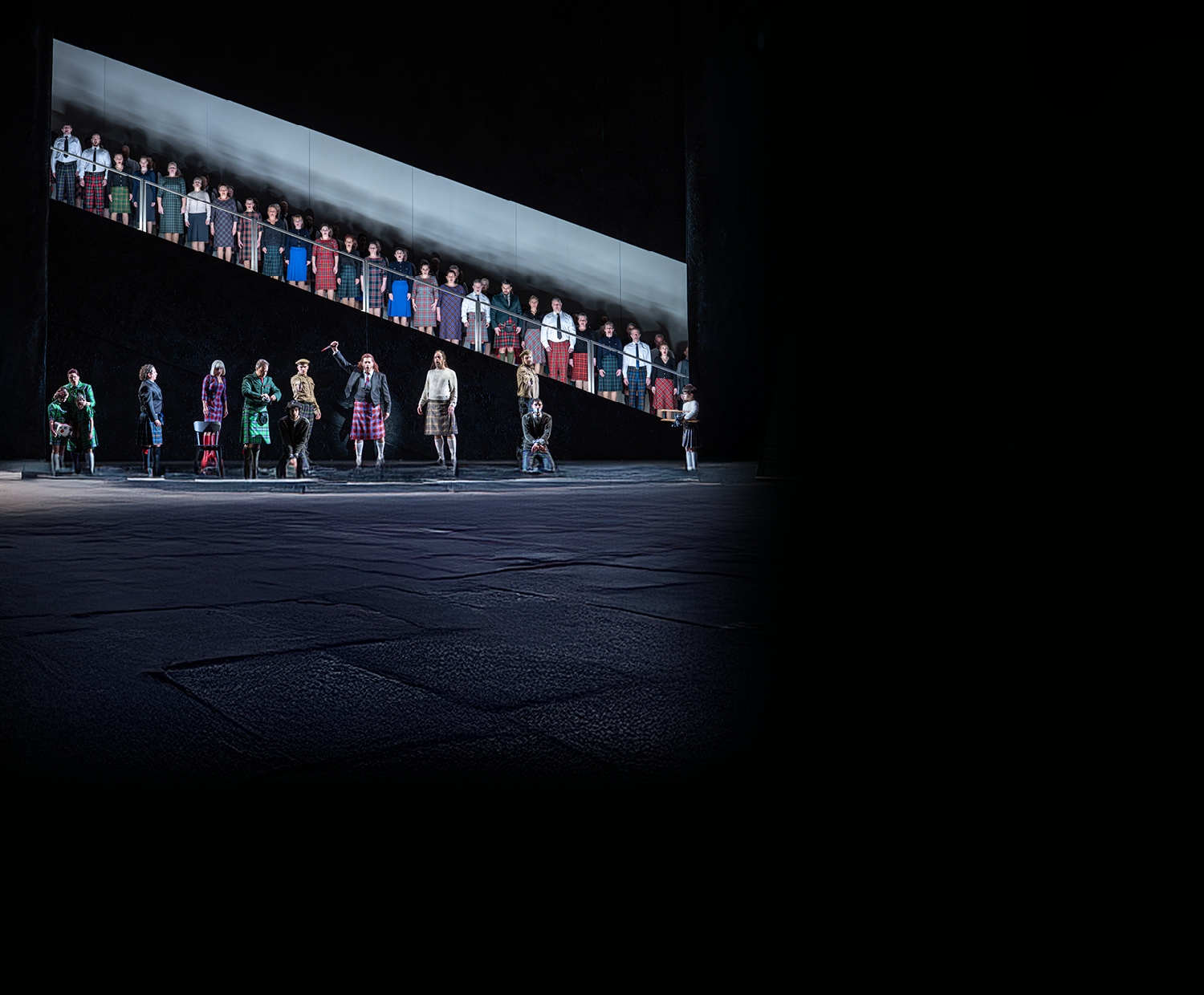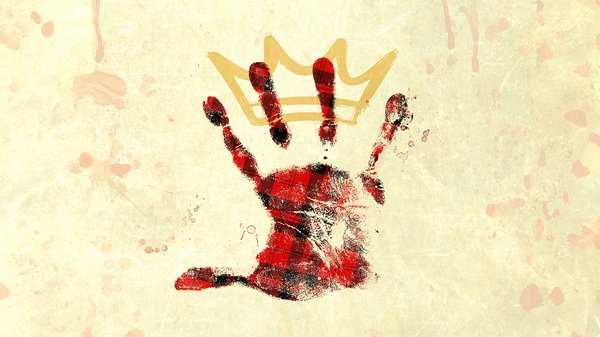
Macbeth
Details
In Brief
Macbeth hears a prophecy from three strange witch-like figures that he will become king of Scotland. The news triggers a series of brutal thoughts and actions in him and even more so in his wife, Lady Macbeth. It was not by chance that Verdi chose this Shakespeare text as the basis of his opera: the title character goes through the hell of spiritual depth, doubts and ruthlessness, unearthly forces, dramatic murders, and psychic turmoil again and again. Situation and motifs that yearn for an opera stage and unfold to music. The production is staged by South-African Matthew Wild, who is widely recognized as a leading musical theatre director of his generation. In his production of Macbeth, a central role is given to the clash and interplay of cultures, and just as in the work itself, the earthly and the mystical–transcendental worlds intertwine in sharp contrast.
Parental guidance
Production warnings
Strong flashing lights are used in some scenes of the performance which could disturb those with photosensitivity.
Events
Premiere: Feb. 22, 2025
Synopsis
Scotland; some time in the near future. The United Kingdom has splintered, and democracy has given way to authoritarian dynasty rule in the independent nation. National dress has become widely embraced, and border conflicts with England are once again commonplace.
ACT I
As they return victorious from the battlefield, Scottish generals Macbeth and Banquo meet three witches who prophesy the future. They address Macbeth as Thane of Cawdor and King of Scotland, and tell Banquo that he will be the father of kings. The two men try to learn more, but the witches vanish. Messengers arrive with news that Duncan, the current king of Scotland, has made Macbeth Thane of Cawdor. The first part of the witches’ prediction has come true.
In Macbeth’s castle, Lady Macbeth reads a letter from her husband telling her of the events that have just transpired. She resolves to follow her ambitions, and calls on demonic spirits to remove her maternal instincts. A servant announces that Duncan will soon arrive at the castle, and when Macbeth enters, she tells him that they must kill the king. Duncan arrives with the returning war heroes: his son Malcolm, Banquo and Macduff, leading to a series of happy family reunions. Macbeth has a vision of a dagger, then leaves to commit the murder. On his return, he tells his wife how the act has frightened him, and she tells him that he needs more courage; she returns to the site of the murder to smear blood on the King's sleeping attendants.
Banquo enters with Macduff, who discovers the murder, and tries to shield his wife and children from the awful sight. Macbeth and Lady Macbeth pretend to be horrified and join the others in condemning the murder, before Macbeth accuses and executes the King's attendants.
ACT II
Macbeth has become king. Malcolm has fled to England, stoking suspicion that he may have been behind the plot to kill his father. Worried about the prophecy that Banquo’s children will rule, Macbeth and his wife now plan to kill him and his son, Fleance, as well. As Macbeth leaves to prepare the double murder, Lady Macbeth hopes that it will finally make the throne secure.
Outside the castle, assassins wait for Banquo, who appears with his son, warning him of strange forebodings. Banquo is killed, but Fleance escapes.
Lady Macbeth welcomes dignitaries to an unveiling ceremony, and sings a drinking song, while Macbeth receives news that Banquo is dead and his son has escaped. About to take Banquo’s seat, Macbeth has a terrifying vision of the dead man accusing him. His wife is unable to calm her unsettled husband, and the guests wonder about the king’s strange behavior. Macduff fears for his life and vows to escape to England, leaving his wife and children alone in Scotland.
ACT III
The witches gather in greater numbers, and Macbeth visits them, demanding more prophecies. Apparitions warn him to beware of Macduff and assure him that “no man of woman born” can harm him, and that he will be invincible until Birnam Wood marches on his castle. In another vision, he sees a procession of future kings, followed by Banquo. Horrified, Macbeth collapses. The witches disappear and his wife finds him. They resolve to kill Macduff, Lady Macduff and their children.
ACT IV
On the Scottish border, Macduff has joined the refugees. His wife and children have been killed. Malcolm appears with English troops and leads them to invade Scotland.
Lady Macbeth is sleepwalking, haunted by visions of those she and her husband have murdered.
Macbeth awaits the arrival of his enemies and realizes that he will never live to a peaceful old age. Messengers bring news that Lady Macbeth has killed herself, and that Birnam Wood appears to be moving. English soldiers appear, camouflaged with its branches. Macduff confronts Macbeth and tells him that he was not born naturally but had a Caesarean birth. He kills Macbeth and proclaims Malcolm king of Scotland.
Media
Opera guide
The director’s concept
Four centuries after its first publication, Shakespeare’s Macbeth remains a strikingly acute psychological exploration of overwhelming guilt in those who cross too many lines in their pursuit of power. Page after the page, the play overflows with vivid, startling images that have lost none of their power to shock, thrill, and confound modern audiences. Verdi was a lifelong admirer of Shakespeare, and for our new production, we chose to adopt a distinctly Shakespearean approach – through a contemporary visual lens.
We decided to restore key elements from the original play, starting with three ‘weird sisters’ who later multiply to become Verdi’s three-part chorus. We also included narrative details such as the execution of Duncan’s attendants and created a prominent role for Lady Macduff and her children (repurposing music originally assigned to Lady Macbeth’s lady-in-waiting). We replaced 11th-century Scotland with a speculative, independent Scotland a few decades in the future (following an imagined collapse of the United Kingdom) where democracy has given way to authoritarian dynasty rule, and where border conflicts with England are once again commonplace. With early performances of the play in mind, we rejected realistic scenery, and set designer Sebastian Hannak chose an essentialised, minimalist aesthetic for the stage space, dominated by a huge staircase which allows for an endless cycle of Sisyphean ascents and descents into darkness, throwing sharp focus onto the text and the performers.
Shakespeare’s exploration of patriarchy and masculinity is particularly intriguing. Gender roles are questioned and subverted from the very beginning, when Banquo observes of the androgynous witches, “You should be women, / And yet your beards forbid me to interpret / That you are so.” In our production, these beards resemble Macbeth’s own, suggesting that the witches are a reflection of his deepest fears and insecurities. When Lady Macbeth decides to murder the King, she calls on infernal forces to strip her of her maternal instincts, to be replaced by a brutal, strained masculinity. Upon the men’s return from war, the childless Macbeths are visibly isolated from the warm father-son bonds in the families around them. Finally, the prophecy that Macbeth can be killed by “no man of woman born” delivers a chilling twist in the upside-down world of this eternally relevant morality play.
Matthew Wild
The conductor’s thoughts
After completing the first version of Macbeth, in a letter, Verdi wrote the following to his former father-in-law and patron, Antonio Barezzi: “Now I am sending you Macbeth which I prize above all my other operas, therefore I consider it more worthy to present it to you.” Obviously, in 1847, Verdi could not take into account the operas he had yet to compose, but his choice is still remarkable and telling, especially considering that by this time, such works as Nabucco, Attila, I due Foscari, and Ernani had already been completed. Furthermore, it is of essential significance that this was his first opera based on a play by Shakespeare.
For our current production, we have chosen the 1865 Paris version in Italian. There are roughly five significant differences between the two versions. One of the most noticeable distinctions between the 1847 and 1865 versions can be found in Lady Macbeth’s first aria in Act II. The original aria “Trionfai! Securi alfine...” in B-flat major is a pure bel canto bravura aria, which, while musically dazzling, does not, in my view, capture the tension, doubts, and extreme emotions of the scene where Macbeth and Lady Macbeth decide that Banquo and Fleance must be eliminated. In the 1865 version, Verdi replaced it with a new aria, “La luce langue...”, whose constantly shifting E major – E minor tonal pair chillingly conveys the terrifying duality of the impending deed. The dramatic depth of this aria demonstrates that by the 1860s, Verdi had become a truly dramatic composer. Just as Wagner had to include a ballet in Tannhäuser, Verdi was also required to add one for the Paris premiere of Macbeth, placing it in Act III. However, in our production, we have omitted it to preserve the continuity of the drama. Another key difference is regarding the final scene in the Florence version, where Macbeth sings an aria. In the Paris version, Verdi brings Lady Macbeth back into the scene instead, concluding the act with a duet. Additionally, Act IV received a new opening chorus and a revised ending, which altered the overall tone of the opera’s conclusion.
Verdi magnifies the significance of certain characters, significantly reduces others, and omits some from the opera entirely. Beyond simply shortening the play, I believe the composer’s goal was to focus the audience’s attention squarely on the title character. While Lady Macbeth is undoubtedly a major role, Macbeth’s personal tragedy remains Verdi’s primary focus. In Shakespeare’s play, I find Macduff to be a particularly important character, yet for some reason, Verdi develops his role to a lesser extent. However, I appreciate that director Matthew Wild incorporates Lady Macduff and her children – who do not appear in the opera – into the production. This creative choice lends an especially spinechilling dimension to Macduff’s aria in Act IV. Overall, in terms of structure, Macbeth stands out within Verdi’s oeuvre as exceptionally compact and well-proportioned.
For me – and for Macbeth –, the witches represent a higher power, and their prophecy signifies a kind of predestination. The most dangerous mental state in exercising power and the struggle for power is when an individual is convinced that they are acting in the name of a higher, superhuman order (even God, in a different context), as no mortal can challenge or question this non-human law. Thus, the ruler or power-seeker can shape, interpret, and explain it according to their current interests. The heightened role of the witches adds an extra layer of mysticism to the work, which Verdi, as a composer, exploits to the fullest. Similar musical functions can be found in Il trovatore or La traviata, where the gypsy choruses serve a similar purpose. In Macbeth, the witches are depicted with a distinctive 6/8 rhythm and a characteristic minor key, which are also similar to the aforementioned gypsy choruses. The most important aspect in my opinion is that the music of Macbeth focuses on depicting the dramatic situation precisely. Nevertheless, it is indeed striking that Verdi associates certain melodies, keys, and even time signatures or rhythms with specific characters, personalities, or situations. Several of these can already be heard in the prelude of the opera. From this perspective, you could even argue – perhaps with some exaggeration – that this opera already reveals the composer’s intent to connect the characters on stage much more precisely with their own motifs or musical material within the orchestral accompaniment.
Martin Rajna
